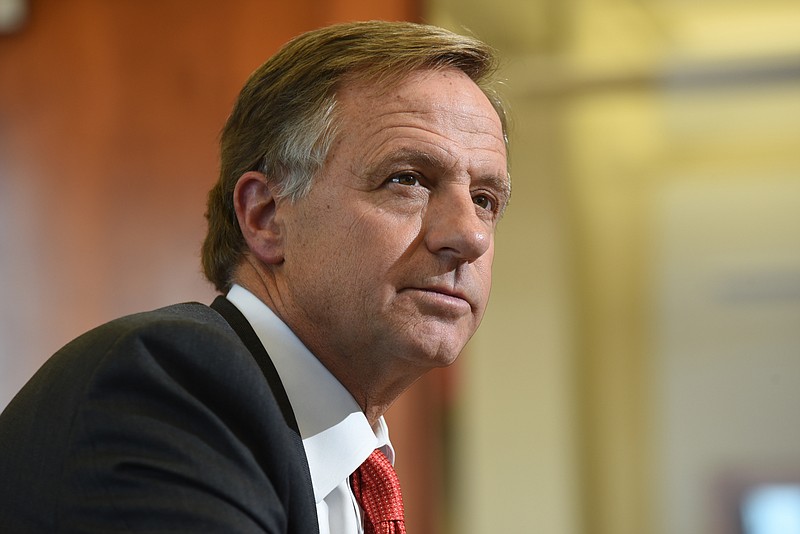JACKSON, Tenn. - Gov. Bill Haslam said there must be a "comfort level" for his expected transportation program that balances both state and local transportation needs with what gas and diesel tax increases Tennessee lawmakers and consumers can accept.
"We obviously have to do something that can get passed," the Republican told reporters following a community health event in Jackson on Wednesday. "I think everybody agrees we have to do something. The question now is what."
He said he expects to present a plan "in the next couple of weeks" and before he delivers his State of the State on Jan. 30 to the 110th General Assembly.
The governor has been meeting for weeks with Republican members of the GOP-controlled House and Senate in advance of the Legislature convening Tuesday. He is now also talking with at least some Democrats as he seeks to build support for new revenue.
Asked about Senate Republican Caucus Chairman Bill Ketron's comments that the governor and Transportation Commissioner John Schroer have "kicked around" recommending a 9-cent gas tax boost and an additional 12-cent hike on diesel, Haslam demurred, saying, "We're in the middle of conversations with legislators to see what will work.
"We haven't arrived at a number we're ready to present yet," he maintained. "But we obviously plan on doing that in the next couple of weeks."
Other lawmakers report hearing about the same pitch as Ketron but sometimes with slightly different figures. There's also discussion about an accompanying increase in annual vehicle registration fees.
Tennessee has not raised gas or diesel taxes in 26 years. The gas tax is 21.4 cents per gallon while diesel is 18.4 cents. Each penny on gas raises about $30.7 million, while each cent on diesel brings in $10.1 million.
A 9-cent increase would generate $276.3 million annually, while 12 cents more on diesel would bring in $121.2 million for a combined $397.5 million in new revenue.
Haslam first began talking about an increase in 2015 and delayed it last year at election-year wary Republican leaders' request.
But Haslam says higher vehicle fuel efficiency combined with higher construction and road maintenance costs are putting the state's interstates and roads, along with local transportation, further behind, leading to traffic congestion and other issues.
Meanwhile, a Vanderbilt University poll of Tennessee registered voters found that 55 percent said they could accept an 8-cent gas tax increase.
The governor said Wednesday while the funding situation is not yet at a crisis point, it ultimately will be and he wants to settle it before leaving office in 2019. He pointed to West Tennessee county and city mayors in the room, noting, "if you went to each of these mayors here, they'd each say, "Please, please get something passed, because we're starving when it comes to road money under the current structure."
The state currently has a $6 billion backlog in previously approved transportation projects that will take years to complete. Moreover, Haslam has argued, there are billions of dollars worth of additional projects waiting for state approval but no funding to get them off wish lists.
Local governments share in gas and diesel revenues, but a number also use sales tax and property tax revenues to supplement spending.
A number of Republicans are talking about the state using one-time surpluses estimated at nearly $1 billion to address transportation.
But Haslam said the one-time surplus revenues "that we have are just that and [we] can't build a road program off non-recurring dollars."
Recurring monies are projected to approach as much as $800 million in new dollars in the governor's 2017-16 fiscal year budget.
That comes primarily from state sales tax and business franchise and excise tax revenues.
But Haslam said the state has additional needs ranging from the Basic Education Program funding formula for K-12 schools to an estimated $250 million more for the TennCare health program, as well as salary increases for state employees, teachers and higher education staff.
With Republican lawmakers talking tax cuts to balance fuel tax increases, the governor warned of perils there if things are not thought through and wrong moves are made. Right now, he noted, the state has flexibility to consider "some tax cuts that do make sense."
Attending Haslam's Healthier Tennessee event, where the governor did not discuss transportation, was Sen. Ed Jackson, R-Jackson. He said he believes the diesel tax rate should be set at the same rate as gas.
"What I'd like to see is maybe index fuel prices to the rate of inflation" in the future, Jackson added. "And maybe cap it at half a percent [annually]. That would be an option possibly for down the road so we wouldn't have to address this again.
"But it's going to have to be addressed with the funding dwindling away because of [increased] fuel efficiency of cars," he said. "Something's going to have to be done."
Crockett County Mayor Gary Reasons said he and other county mayors in West Tennessee face deteriorating roads and bridges.
Moreover, he added, "transportation is of utmost importance for economic development, and I think that communities need to get behind the governor when he comes up with a plan or when TDOT develops a plan. We've got to have something to shore up declining infrastructure right now."
Contact staff writer Andy Sher at asher@timespress.com or 615-255-0550. Follow him on Twitter @AndySher1.
